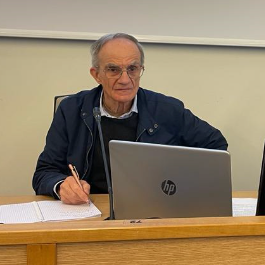 Asked by the Steering Committee to give the following day the final talk, I could not think of a better way than to follow the well-known method, see, judge and act. I have tried to bring together the main points of the Seminar for each of these three phases. You find here below what I made of it. It is a bit heavy reading… All the same, I hope it be of use to you.
Asked by the Steering Committee to give the following day the final talk, I could not think of a better way than to follow the well-known method, see, judge and act. I have tried to bring together the main points of the Seminar for each of these three phases. You find here below what I made of it. It is a bit heavy reading… All the same, I hope it be of use to you.
- The SEMINAR on the Changing Landscape of Religious-Missionary Life was an invitation to become more aware and to explore somewhat what is happening in the world in which we live today and in which we are called to live our missionary religious vocation according to the charism of our institutes, keeping in mind too what is happening in our institutes and in the Church.
The world in which we live is characterized by change, which is continuous, rapid, global, unpredictable; a world of increasing cultural differences, of diversity of religious expressions, of changing social and societal values with affirmation of rights, demands for justice and claims for recognition, respect and participation; a world of global communication and interconnectedness, allowing for awareness and participation; where climate change and its impact on the environment and on populations are dangerously increasing.
Cultural and religious traditional reference points are in some parts of the world no longer bearers of meaning nor pointers to global human ideals, while in other parts decreasingly so. Autonomy, personal fulfilment and freedom are given priority, weakening a sense of solidarity and community at all levels.
- This SEMINAR helped us to revisit our call to the missionary consecrated life. We recalled the paradigmatic intervention of God in Exodus 3 to set his people free – God touched and moved by the plight of the oppressed and deciding to act – ; recalling the message of Jesus fulfilling the prophecy of Isaiah 61 and through his death and resurrection breaking down all barriers allowing all to become beloved children of God, leading Saint Paul to write in his letter to the Galatians: There is now no longer Jew nor Greek, slave nor free citizen, woman nor man, as all of you are one in Christ Jesus (Gal. 3:28).
- Empowered by the Holy Spirit and believing that God is always at work (John 5) to bring about the realization of his loving design for humanity, it is with hope and joy that we look at our world, the Church and our institutes discerning the signs of the times, thanking God for what we are called to let go and free ourselves from, asking his grace for the new ventures He calls us out to engage in; setting out accepting that we do not have ready-made answers nor solutions.
We journey together in community and with others, acknowledging differences and seeking together how to live evangelical lives, upholding the dignity and the freedom of every person, privileging concertation and dialogue as we promote the unity of the community; discerning together where and for doing what God is calling us.
We engage in learning the language of today’s world so as to be witnesses of God’s love to all, a credible and relevant presence of the charism of our institutes and of the Church, to discover ways to acculturate the Gospel message and to allow for its inculturation, thus enhancing the coming of the God’s Kingdom calling all to racial, civic and social justice.


